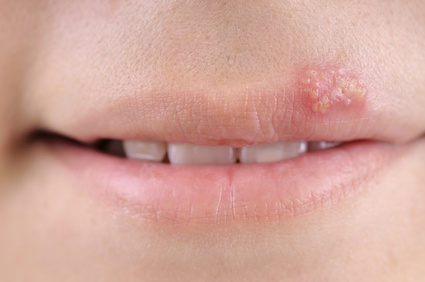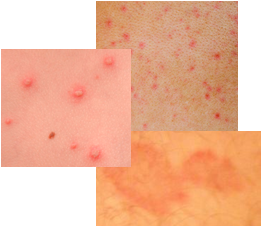Cold Sores and Cold Sore Cure
Visit this
PICTURES OF RASHES PAGE
People often desire a cold sore cure because these types of sores are very uncomfortable and often embarrassing.
What is a Cold Sore?
A cold sore is often called a fever blister. The herpes simplex type 1 virus causes it. This is different than the herpes simplex type 2 virus, which causes genital herpes and is spread by sexual contact. The type 2 virus may also cause cold sores and the type 1 can cause genital sores as well. People usually contract the herpes simplex type 1 virus when they are very young. After they have the virus, it remains in the body and does not leave.
Cold Sore are Contagious

Cold sores are very contagious and can be passed from person to person through skin contact. They can be spread whether cold sores are actually visible or not visible. Common methods of spreading cold sores are: kissing, sharing drinking cups or cans, sharing eating utensils, and skin contact with a person who has touched their open cold sore and has contaminated fingers or hands.
Estimates are that by the age of 50, up to 90 per cent of the American population will have the virus that causes cold sores. Of this amount, 20 to 40 percent will actually develop cold sores, which are usually recurrent and require a cold sore treatment or remedy. The remaining percentage of people may never have them. This can be because the virus remains dormant in the body or the body likely develops antibodies to counteract the virus and therefore no cold sores develop and no cold sore treatment is necessary.
Cold Sore Causes
Why do cold sores appear, disappear, and reappear for some people? It is not certain why this occurs. However, some possible triggers include: fever, other infections in the body, stress, fatigue, sunburn, cold weather, overly dry lips, hormonal changes such as those that occur during menstruation or pregnancy, trauma to the mouth region, tooth extractions, various drugs, vitamin or mineral deficiencies, or certain types of food. Many of these factors lead to a compromised immune system and this likely causes the virus to become active and require a cold sore cure or treatment.
Symptoms of Cold Sores
When a cold sore develops, people may feel a tingling on or around the lip area. This is followed by the development of a skin irritation in the affected area or a small hard spot that is not visible. Redness, pain, burning, or itching characterizes the skin irritation. Some individuals will develop flu like symptoms before a cold sore outbreak occurs. Within a couple of days red blisters will appear that will break and leave open sores that ooze fluid or pus. After a few days, the sore or sores dry up and form a yellow crust. This crust or scab will eventually fall off once the skin underneath it has sufficiently healed.
Cold sores are most often found in the facial area, either on the lips or on the skin around the lips. Cold sores may also be found on or around the nose, chin, or cheeks. Younger individuals may also experience problems with their gums or throat. Cold sores can be transmitted to the skin on other parts of the body such as the eyes or fingers. The virus entering the eyes can be quite problematic and can lead to an eye infection or blindness in more severe cases.
Usually cold sores or fever blisters will require 10 to 14 days to heal without a cold sore cure. With a cold sore treatment, the severity of the symptoms can be reduced and the healing time minimized.
Prevention of Cold Sores - A Cold Sore Cure
Before discussing a cold sore cure or treatment, it is a good idea to discuss prevention. Tips to prevent the spread or outbreak of cold sores are listed below.
- Avoid the triggers that may be responsible for outbreaks such as stress, fatigue, a facial sunburn, exposure to cold weather, and exposure to dry air environments.
- Apply a moisturizing lip balm with UV protection when outdoors to protect against sun, wind, and dry cold air.
- Acidic and salty foods will irritate the sores and cause more pain. It is best not to consume these foods during an outbreak.
- Avoid coffee because some believe it can increase the frequency of cold sore outbreaks.
- Individuals with cold sore symptoms should keep away from other individuals to avoid spreading the virus. Skin contact activities such as kissing should be prohibited.
- Avoid sharing food, utensils, etc.
- Infected individuals should wash their hands frequently to limit the chances of the virus being passed on to others. This is especially important if the sore is touched.
- Avoid touching the blisters or sores and definitely do not pinch, pick, or squeeze them.
- Do not use cosmetics on the affected areas because they may irritate the cold sores.
Cold sore cures can be found at this cold sore treatment page.
Other lip skin care resources:
lip treatments | canker sores | cold sore cure | chapped lips | lip plumpers | homemade gloss | angular cheilitis
